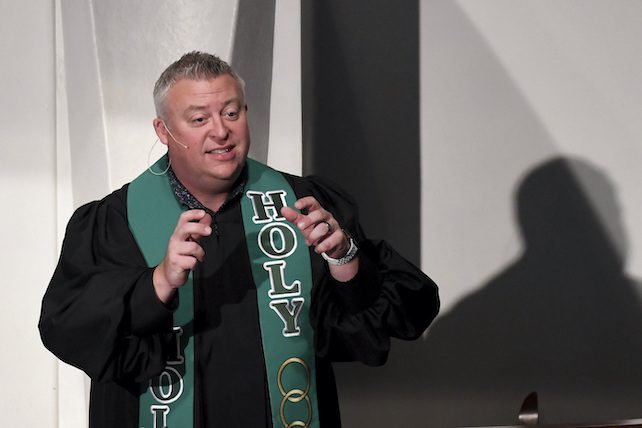Conservatives say denominational leaders are making it difficult for those who want to leave to do so, however.
Currently churches may leave after paying two years’ worth of “apportionments” — essentially denominational dues — plus their share of unfunded pension liabilities. Conferences may also impose additional requirements, and some are asking for a percentage of the property value of church buildings.
“In many cases, (the requirements) are onerous, they are punitive,” said the Rev. Jay Therrell, president of the Wesleyan Covenant Association, a conservative advocacy group that is working to help churches jump to the Global Methodist Church.
Bishop Karen Oliveto of the UMC’s Mountain Sky region — who in 2016 became the UMC’s first openly lesbian bishop — said via email it is “extremely wounding to LGBTQ persons that our very personhood is being used as a wedge to disrupt unity in the church.” She expressed hope that UMC churches “will be safe places for all people, regardless of sexual orientation or gender identity.”
Conservatives have lamented that UMC has failed to enforce its Book of Discipline on standards for ordination and marriage.
Oliveto said, however, that sometimes “the Holy Spirit runs ahead of us and gives us a glimpse of the future to which we are called. This is certainly the case across the denomination, where LGBTQ persons have been examined at every step of the ordination process and found to possess the gifts and graces for ordained ministry.”
United Methodists are part of a global movement that traces their origins to the 18th-century English revivalist John Wesley, who emphasized personal piety, evangelism and social service.
American membership has declined to about 6.5 million, from a peak of 11 million in the 1960s. Overseas membership soared to match or exceed that of the U.S., fueled mostly by growth and mergers in Africa.
It’s too early to say if there will be widespread departures from international churches. African churches, for instance, often combine conservative stances on sexual issues with progressive views on the economy and colonialism’s legacy.
Several African bishops issued a statement denouncing conservative advocacy groups, including one called the Africa Initiative, for collaborating to “destroy our United Methodist Church.”
The Africa Initiative replied that it respected the bishops but would continue its efforts “to see biblical Christianity taught, lived and sustained.”
Neal Christie of the Love Your Neighbor Coalition, a partnership of progressive and ethnically based Methodist advocacy groups, said the “notion that outside the United States there’s one monolithic voice is a caricature.”
The coalition is promoting a more decentralized church where regions could make their own decisions on issues such as LGBTQ inclusion based on their cultural contexts.
“We believe this is a big tent church, that the church is big enough for all,” he said.
But after decades of controversy, some are done.
“The traditionalists decided this is like a toxic relationship now, and we’re just harming each other,” said the Rev. Laura Saffell, chairperson of the Western Pennsylvania chapter of the Wesleyan Covenant Association. “The best we can do is bless and send” each other their separate ways.
___
Associated Press religion coverage receives support through the AP’s collaboration with The Conversation US, with funding from Lilly Endowment Inc. The AP is solely responsible for this content.
This article originally appeared on APNews.com.

